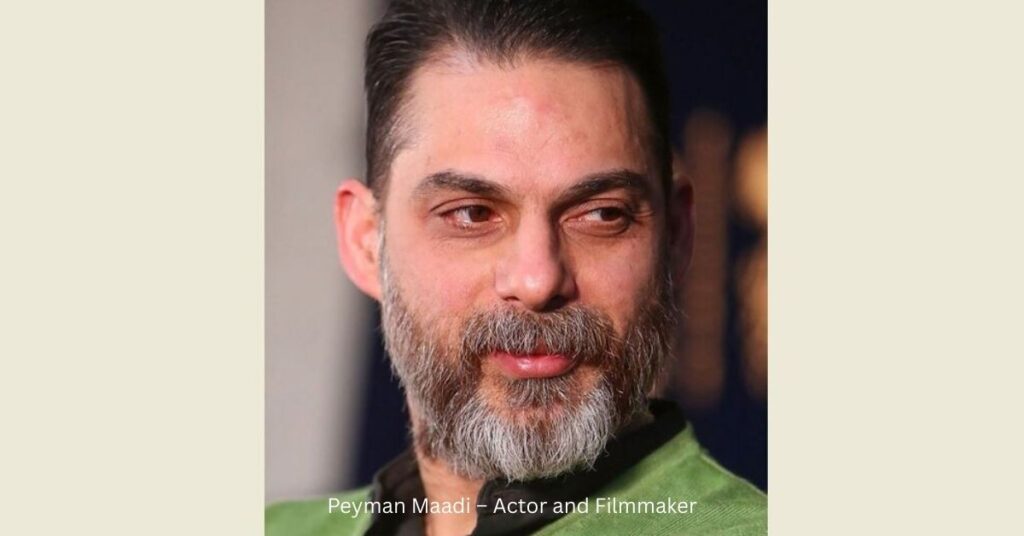Peyman Maadi is a highly acclaimed Iranian-American actor, screenwriter, and filmmaker who has made a significant mark in both Iranian cinema and Hollywood. Known for his versatile performances and unique storytelling abilities, Maadi has become one of the most respected figures in contemporary cinema. His career reflects a remarkable journey from writing screenplays to acting in award-winning films and eventually directing his own projects.
Early Life and Education
Peyman Maadi was born on June 30, 1972, in New York City, United States, to Iranian parents. His family later moved to Iran, where he was raised and educated. Maadi studied metallurgical engineering at university, but his passion for storytelling and cinema drew him towards the film industry. This transition proved to be life-changing, as he soon became one of Iran’s most celebrated actors and filmmakers.
Career as a Screenwriter
Before stepping in front of the camera, Maadi began his career as a screenwriter in the late 1990s and early 2000s. He wrote several successful scripts for Iranian films, establishing his reputation as a talented storyteller. His early work showcased his ability to create engaging narratives rooted in Iranian society and culture.
Breakthrough as an Actor
Peyman Maadi’s acting career took off when he collaborated with the celebrated Iranian director Asghar Farhadi. His role in “About Elly” (2009) introduced him to international audiences. However, it was his performance in Farhadi’s “A Separation” (2011) that truly propelled him to global recognition.
The film won the Academy Award for Best Foreign Language Film and earned critical acclaim worldwide. Maadi’s portrayal of Nader, a man caught in the complexities of family, morality, and justice, was praised for its depth and emotional intensity. This role established him as one of the most talented actors of his generation.
Transition to International Cinema
Following his success in Iranian films, Maadi expanded his career into international cinema. He appeared in Hollywood productions such as:
- “Camp X-Ray” (2014) alongside Kristen Stewart
- “Last Knights” (2015) with Morgan Freeman and Clive Owen
- “6 Underground” (2019) directed by Michael Bay
These roles highlighted his adaptability and ability to perform across different genres and languages, further solidifying his reputation as a global actor.
Work as a Filmmaker
In addition to acting, Peyman Maadi pursued filmmaking and made his directorial debut with “Snow on the Pines” (2012). The film was well-received for its strong performances and compelling narrative, earning Maadi recognition as a filmmaker to watch. His directorial vision often explores themes of human relationships, morality, and social issues.
Awards and Recognition
Peyman Maadi has received numerous awards throughout his career, including:
- Silver Bear for Best Actor at the Berlin International Film Festival (2011) for A Separation
- Recognition at various international film festivals for both his acting and directing work
His ability to seamlessly move between Iranian cinema and Hollywood makes him one of the few Iranian artists with truly international acclaim.
Influence and Legacy
Peyman Maadi’s career stands as an inspiring example of artistic versatility. As an actor, he has captivated audiences with performances that combine subtlety and emotional power. As a filmmaker, he has proven his ability to tell stories that resonate on both cultural and universal levels.
Through his work, Maadi has bridged the gap between Iranian cinema and global audiences, playing a vital role in showcasing the richness of Persian storytelling on the world stage.
Conclusion
Peyman Maadi is more than just an accomplished actor—he is a storyteller who continues to impact both Iranian and international cinema. His career trajectory, from screenwriter to award-winning actor and filmmaker, highlights his dedication to the art of storytelling. With each role and directorial project, Maadi continues to solidify his place as one of the most influential voices in contemporary cinema.




